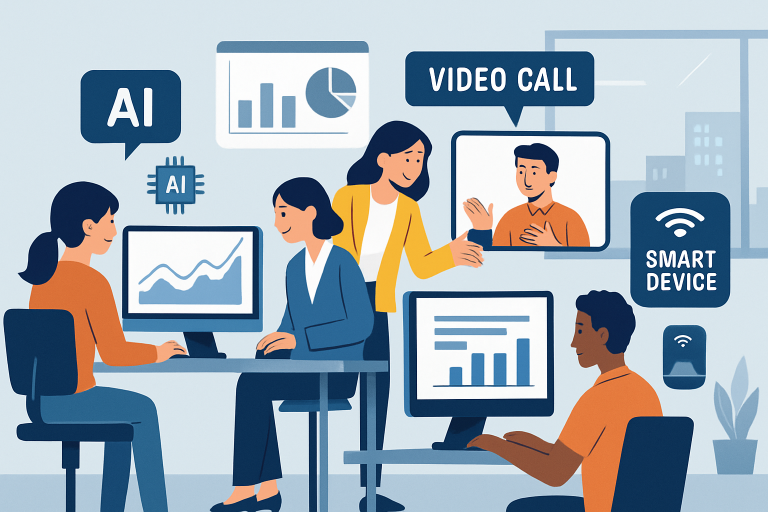The modern workplace is transforming due to rapid tech advances, like cloud tools and AI. Traditional offices with paperwork and meetings are shifting to flexible, efficient environments that boost productivity, creativity, and adaptability in a fast-changing business world.
The traditional office has evolved due to technological innovations, transforming how professionals connect, collaborate, and work. Modern offices adopt smarter, efficient methods, boosting productivity, fostering innovation, and providing flexibility. Embracing these changes helps organizations stay competitive. For any organization looking to gain a visible edge online, working with the best SEO agency can ensure their digital transformation is mirrored by enhanced online visibility and growth.
Across industries, leaders see workplace tech as a fundamental shift, enriching daily work. These advancements help teams reach potential amid blurred lines between in-office and remote work. This article examines how technology redefines office life and how businesses can use these changes to boost performance and employee satisfaction.
Remote Work and Digital Collaboration
Thanks to robust technological solutions, remote work has surged from a niche benefit to a mainstream workplace staple. High-speed internet, cloud computing, project management platforms, and instant communication apps mean work is no longer tied to a specific location. This flexibility has ushered in a new era of inclusivity and productivity, leading to noticeable boosts in morale and work-life balance. The shift to flexible work schedules and remote collaboration has made location far less relevant, opening the talent pool globally and requiring digital competency from both employers and employees.
Artificial Intelligence and Automation
AI is now integral to the modern workplace, transforming tasks such as data analysis, scheduling, and customer communication through intelligent chatbots. This frees employees from repetitive work, enabling them to focus on strategic, creative roles. As AI matures, businesses are quickly adopting it to improve agility, reduce errors, and make better decisions, helping them stay competitive in changing markets.

Smart Office Technologies
Modern offices use smart tech like IoT devices and biometric systems to improve security and efficiency. Facial recognition clock-in reduces errors and streamlines payroll. Automated lighting and climate control lower energy use, boost employee comfort, cut costs, and support sustainability, enhancing company reputation.
Data Analytics for Informed Decision-Making
Data drives modern business decisions. Analytics enable managers to use real-time data for measuring productivity, forecasting trends, and assessing customer satisfaction. Detailed analysis helps organizations identify improvement areas, optimize workflows, and deploy targeted strategies that impact profits. Data-driven companies pivot faster, outmaneuver rivals, and foster a culture of continuous improvement and innovation, vital for success in the digital age.
Health and Well-being Focus
Employee health is now a key focus of office innovation. Wearable tech like smartwatches provides insights into activity, sleep, and stress. Apps that promote mindfulness and mental health are also used, especially as work-life boundaries blur.
Implementing wellness tech reduces absenteeism and turnover, and increases satisfaction, boosting productivity and growth. Investing in these tools shows care and supports long-term success.
The traditional office—with its fixed desks, filing cabinets, and 9-to-5 schedule—is becoming obsolete. Technology isn’t just changing how we work; it’s redefining what work means.
The Death of Geographic Boundaries
Remote collaboration tools have made physical proximity irrelevant. Video conferencing, cloud storage, and project management platforms enable teams to function seamlessly across continents. This shift isn’t temporary—it’s a fundamental restructuring of work geography. Companies now access global talent pools, while employees gain unprecedented flexibility.
AI as the New Colleague
Artificial intelligence has evolved from a buzzword to an essential coworker. AI handles data analysis, automates repetitive tasks, and even assists in creative processes. The most successful professionals aren’t those who resist AI, but those who learn to collaborate with it effectively. This partnership amplifies human capabilities rather than replacing them—at least for now.
The Paperless Reality
Digital transformation has finally delivered on its decades-old promise. Documents live in the cloud, signatures happen electronically, and workflows exist entirely in digital space. This shift saves more than trees—it accelerates decision-making and eliminates the friction of physical document handling.
Always-On Connectivity: Blessing and Curse
Smartphones and instant messaging have created an expectation of constant availability. While this enables rapid problem-solving and flexible scheduling, it also blurs work-life boundaries dangerously. The challenge isn’t technological—it’s cultural. Organizations must deliberately create digital boundaries to prevent burnout.
Data-Driven Everything
Every interaction generates data. Smart offices track space usage, energy consumption, and even employee movement patterns. This information optimizes everything from meeting room allocation to coffee supply. However, this efficiency comes with privacy concerns that organizations must address transparently.
The Human Element Persists
Despite radical technological transformation, successful offices still prioritize human connection. Technology should enhance collaboration, not replace it. The best modern offices use technology to eliminate mundane tasks, freeing humans to do what they do best: think creatively, build relationships, and solve complex problems.
The modern office isn’t a place—it’s a network of technologies enabling work to happen anywhere, anytime. This transformation demands new skills, new boundaries, and new definitions of productivity. Those who adapt will thrive; those who don’t will become as obsolete as the fax machine.
Conclusion
Technology is not merely shaping the modern office; it is redefining what workplaces look like and how they operate. From the growth of remote work to the adoption of AI, smart office systems, advanced analytics, and health-focused wearables, these innovations are crafting environments that are more adaptive, efficient, and human-centric than ever before. Organizations that proactively integrate new technologies will be best positioned to attract talent, retain staff, and achieve sustainable growth in an ever-changing business landscape.

